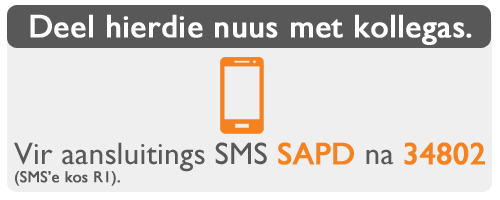
(English follows)
Solidariteit in arbitrasie oor “waterskeidingsaak” rakende erkenning in die SAPD
Solidariteit en die Suid-Afrikaanse Polisiediens (SAPD) het gister met arbitrasie begin om te bepaal of Solidariteit op basiese organisatoriese regte in die SAPD geregtig is.
POPCRU het ’n punt in limine gebring oor die definisie van “verteenwoordigende vakbond.” Al die opponerende partye – SAPD, SAPU, PSCBC en SSSBC – steun POPCRU om Solidariteit se aansoek so te belemmer. Solidariteit is juis in arbitrasie oor die wysigings aan artikel 21 van die Wet op Arbeidsverhoudinge waar wesenlike belang afgespeel moet word teen die gelyke definisie van verteenwoordigendheid.
Die KVBA-kommissaris het vandag dus besluit dat:
- Die punt in limine ondersoek sal word en dat die KVBA binne 14 dae daaroor sal beslis.
- Die KVBA dan sal bepaal of die arbitrasie sal voortgaan al dan nie.
Volgens Johan Kruger, adjunkbestuurshoof van Solidariteit, is dit ’n waterskeidingsaak om te bepaal wat ’n “wesenlike belang” uitmaak. “Die Wet op Arbeidsverhoudinge is onlangs gewysig om te bepaal dat minderheidsvakbonde wat ’n wesenlike belang kan bewys, daarop geregtig is om basiese organisatoriese regte te bekom,” sê Kruger. Hy meld dat die vakbond sterk steun op die kwessie van regstellende aksie as wesenlike belang binne die SAPD. “Meerderheidsvakbonde, soos POPCRU en SAPU, steun ingrypende regstellendeaksiemaatreëls, wat die regte van wit mense en ander minderheidsgroepe vertrap. Ons lede assosieer nie met hierdie vakbonde nie, maar maak op Solidariteit staat om by wyse van aktiewe litigasie en onderhandeling te verseker dat hul regte beskerm word,” het Kruger gesê.
Ander kwessies van wesenlike belang sluit pensioenaangeleenthede en SAPD-werknemers se taalregte in. Die SAPD het onlangs ’n direktief in die Noord-Kaap uitgevaardig wat SAPD-lede verhoed om getuieverklarings in enige ander taal as Engels af te neem. “Die meeste inwoners van die Noord-Kaap is Afrikaanssprekend. Nou word SAPD-lede verbied om diens in Afrikaans te lewer en word hulle selfs met dissiplinêre optrede gedreig. Geen ander vakbond binne die SAPD beskerm hierdie wesenlike belang van lede nie,” aldus Kruger.


Solidarity in arbitration over “watershed case” about recognition by the SAPS
Solidarity and the South African Police Service (SAPS) started with arbitration to determine whether Solidarity is entitled to basic organisational rights within the SAPS yesterday.
POPCRU brought a point in limine dealing with the definition of a “representative trade union”. All opposing parties – the SAPS, SAPU, PSCBC and SSSBC – support POPCRU, thereby impeding Solidarity’s application. The very reason why Solidarity is in arbitration relates to amendments to section 21 of the Labour Relations Act in terms of which significant interest has to be offset against the same definition of representativeness.
The CCMA Commissioner, therefore, today decided that:
- The point in limine be investigated and that the CCMA give a ruling in this regard within 14 days
- The CCMA will then decide whether arbitration will proceed or not.
According to Solidarity Deputy General Secretary Johan Kruger, this would be a watershed case as far as determining what constitutes a “significant interest” is concerned. “The Labour Relations Act was recently amended to make provision for minority trade unions that can prove that they have a significant interest in obtaining basic organisational rights,” Kruger said. He stated that the trade union strongly relies on the issue of affirmative action as a significant interest in the SAPS. “Majoritarian trade unions, such as POPCRU and SAPU, support radical affirmative action measures that trample the rights of white people and other minority groups. Our members do not associate with those trade unions but rely on Solidarity to ensure that their rights are protected by means of active litigation and negotiation,” Kruger said.
Other issues of significant interest include pension matters and the language rights of SAPS employees. The SAPS recently issued a directive in the Northern Cape preventing SAPS members from taking affidavits in any language other than English. “Most residents of the Northern Cape are Afrikaans speaking. By this directive SAPS members are now prohibited from delivering service in Afrikaans and are even threatened with disciplinary action. No other trade union in the SAPS protects such significant interest of members,” Kruger stated.
